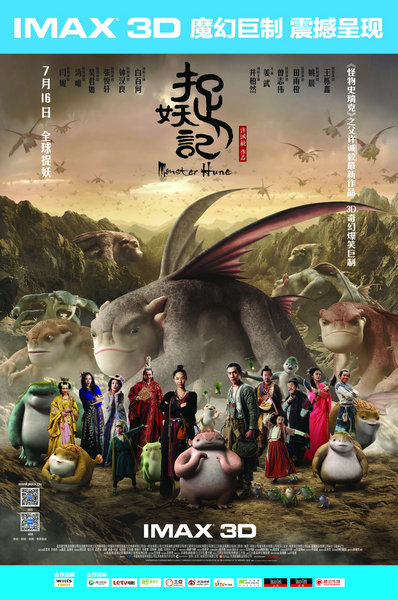
A poster of the fantasy movie Monster Hunt [File photo]
The Chinese film industry has experienced new highs this year, with several breakthrough domestic works proving hits across the country and breaking the box office records time after time. The rise of fantasy films is one of the newest features of the domestic film market.
Chinese filmmakers venture into fantasy
In the past years, fantasy films were less prevalent in China compared with martial arts films, love stories, young adult and anti-war films. However, this year saw a breakthrough for the genre as box office hits Monster Hunt, Chronicles of the Ghostly Tribe and Monkey King: Hero is Back hit the big screen.
Looking back at China's film history, fantasy films did not do particularly well, even though fantasy elements in traditional Chinese culture have been well received both at home and abroad. The main reason for this lackluster performance was a lack of strong concepts and structure in the films.
"A wide diversity of worldviews is the key to a good fantasy film," said Zhao Weifang, deputy head of the film and television department of the Chinese National Academy of Arts.
However, the situation is getting better in recent years as more and more Chinese filmmakers pay attention to the core values expressed in their works, instead of merely focusing on special effects and impressive set pieces.
For example, the 2012 movie Painted Skin: The Resurrection, which broke box office records on the Chinese mainland with 726 million RMB ($113.8 million), won audiences' hearts through its theme of self-sacrifice and love; while this year's record holder (with ticket sales of over $380 million) Monster Hunt shone with its humanist message of the equality of all creatures.
Audiences call for more fantasy films
"The rise of fantasy in the Chinese film market is a sign of industry development and maturity," said Zhang Zhihua, professor of the Media School in Beijing Normal University. Compared with previous years, fantasy film production witnessed a dramatic increase this year.
Yin Hong, deputy director of the Journalism and Communication School of Tsinghua University, holds that the demand for science fiction and fantasy genres is driven by young audiences, who are the main forces in the movie market.
"The internet has nurtured a new generation of audiences who are the main body of film consumers now. They grew up with fantasy stories and products of wild imagination and they value imaginative plots more than realistic depictions," Yin Hong said, stressing that imaginative domestic fantasy movies are in increasing demand in the Chinese market.
Lu Chuan, director of Chronicles of the Ghostly Tribe, thinks that the fantasy genre can be the new engine of the domestic film industry.
"The new audiences with their new tastes demand that fantasy moves into and possibly becomes part of the mainstream culture," Lu Chuan said.
Adaptations still the most popular
The adaptation of the original literature, animations or film has become one of the most popular forms of fantasy movie in China. This is widely called "IP adaptation", referring to the Intellectual Property that the original work holds.
IP adaptation is red hot and saw many examples in China last year. Many fantasy TV series and films based on traditional Chinese culture were adapted from ancient Chinese classic novels, such as Journey to the West (Xi You Ji) and Strange Stories from a Chinese Studio (Liao Zhai Zhi Yi). For example, the Monkey King series was from the former. Rich fantasy elements in the traditional culture provide fertile soil for movie creation.
Meanwhile, online novels are another major resource for IP adaptation. For example, the screen hit Chronicles of the Ghostly Tribe(2015) and the upcoming The Ghouls are both from popular online story The Adventures of Three Tomb Raiders (Gui Chui Deng).
However, the imbalance between IP adaptation and original film creation has become a new problem for the industry.
"Adaptation of celebrated works is important, yet the film industry cannot truly develop without creativity and originality," said Jiang Zhiqiang, the producer of Monster Hunt.
While an over reliance on adaptation can lead to reduced creativity, producing more original stories and plays is a field that Chinese filmmakers need to work on.





